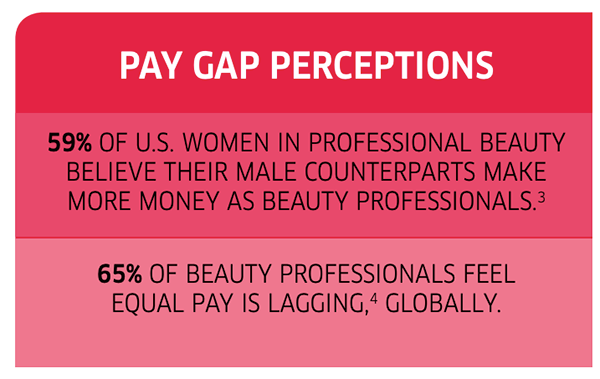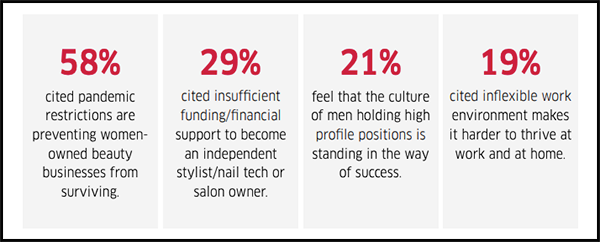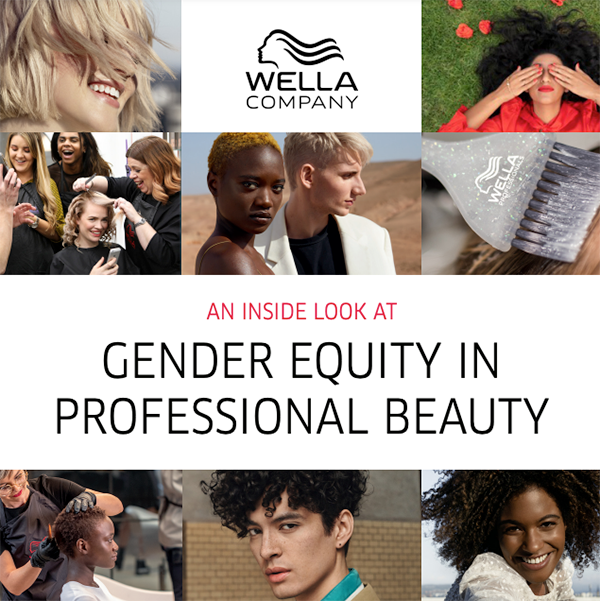Wella Company Examines Gender Equity in Pro Beauty
How The Wella Company Is Examining Gender Equity Amid The Pandemic
Living through a pandemic has magnified disparities in gender equality throughout the world. Women’s jobs are nearly twice as vulnerable to the COVID-19 crisis than men’s jobs, and women make up over half of all job losses through the pandemic, despite only accounting for a third of global employment, according to McKinsey. The pro beauty sector—an industry dominated by women—was one of the hardest hit by the pandemic, and is still recovering.
That’s why Wella Company CEO Annie Young-Scrivner took a deep dive into gender equity in the pro beauty industry just a few months after starting her role in December 2020. “While women dominate the professional beauty service industry in sheer numbers, they are still working towards equal pay and securing positions of decision-making,” Annie wrote in the Wella Company’s Gender Equity report, released earlier this year. “Moreover, during the pandemic, women are losing their jobs or dropping out of the workforce in growing numbers due to caregiving responsibilities and pay inequality.”

The Pay Gap: What Pro Stylists Really Think
Women who worked in personal care services made 85 cents to the dollar men earned in 2019, and about half of beauty pros say leadership opportunities for female beauty professionals are lagging, according to the report. In editorial hairstyling, for example, women make up only about a quarter of the hair talent at major agencies for jobs like magazine covers and ad campaigns.
70% Of Wella’s Recent New Hires Are Women
As the leader of the newly formed Wella Company, Annie is focusing on lessening these gaps and broadening the slate of talent for opportunities in Wella’s brands, including Wella Professionals, Sebastian and OPI. In the three months after the Wella Company was formed, 70% of the company’s 300 new hires were women.
“You always want the best person in the role,” Annie said in an interview during Wella’s Beauty Envision Awards. “We didn’t go out and say, ‘Only hire women.’” We said, ‘Let’s make sure the slate [of candidates] is very diverse.’”
The Wella Company’s hiring makeup is now 57% women, and in roles for director-level and higher, 45% are women. The company just announced three new C-suite executives joining its leadership team, two of whom are women.

COVID-19 Impact: How To Keep Pro Stylists In Business
“COVID has impacted women more so than men,” Annie said. “A lot of women are exiting out [of the job pool]. It’s our responsibility to make sure we can create flexibility to keep them. In an industry that serves mostly women, there should be an opportunity for women to rise up.”

To create those opportunities and enhance equity for all, the Wella Company focused on key areas that will support its 500,000 salon owner partners. Wella has provided more than 100 free education classes online and via Instagram since the start of the pandemic, including its We Create virtual event, a totally free, global digital event packed with business and technical education. The company also offered flexibility in payment terms and deployed $200,000 through Hairdressers at Heart to help pro stylists, nail techs, salon owners and educators through the worst of the stay-at-home orders.
Now, the Wella Company is honing in on innovations that will bridge the gap between the at-home hair trends sparked during lockdowns and the need for professional stylists’ techniques and advice.
“We are in a people business,” Annie said. “The impact that we make is that we can affect lives. We can help hairdressers with new innovation, and they are going to delight their clients.”
Read the Wella Company Gender Equity in Professional Beauty report: Click here.







